 It's been a month or so since the Smackdown for 1966 but sometimes it takes what it takes. And I'm glad to have had the space to reflect upon this one. I find the film Alfie to be a toughie, especially for my "post-feminist" sensibility. The brief distance of time provided by this several week delay has, however, helped me to reflect on Alfie being (not unlike the great comedies of Moliere) a tragedy told in comic terms, in which the central character's fatal flaw is a source of whimsy only until its giddiness hits a series of devastatingly human limits. For, indeed, this is a character-flaw study. The "what's it all about" in Alfie is always the character "Alfie," with the other characters, especially the women, there to "support" his central character arc along what we might today describe as a sex addict hitting bottom. Yet, among these distinct and formidably charismatic women (including the breathtaking Shelley Winters as an American party dame and the excellent Millicent Martin as a wife with a wild streak) is an actress charged with scoring the darkest paths embedded within the audience's journey of discovery of "what's it all about" with Alfie, the blazingly talented...
It's been a month or so since the Smackdown for 1966 but sometimes it takes what it takes. And I'm glad to have had the space to reflect upon this one. I find the film Alfie to be a toughie, especially for my "post-feminist" sensibility. The brief distance of time provided by this several week delay has, however, helped me to reflect on Alfie being (not unlike the great comedies of Moliere) a tragedy told in comic terms, in which the central character's fatal flaw is a source of whimsy only until its giddiness hits a series of devastatingly human limits. For, indeed, this is a character-flaw study. The "what's it all about" in Alfie is always the character "Alfie," with the other characters, especially the women, there to "support" his central character arc along what we might today describe as a sex addict hitting bottom. Yet, among these distinct and formidably charismatic women (including the breathtaking Shelley Winters as an American party dame and the excellent Millicent Martin as a wife with a wild streak) is an actress charged with scoring the darkest paths embedded within the audience's journey of discovery of "what's it all about" with Alfie, the blazingly talented...
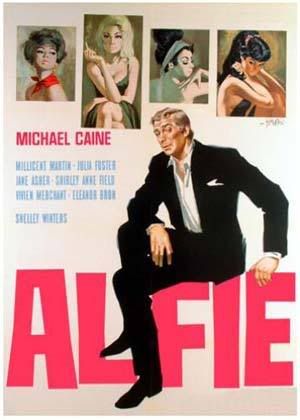
...Vivien Merchant in Alfie (1966)
approximately 15 minutes and 53 seconds
10 scenes
roughly 14% of film's total running time
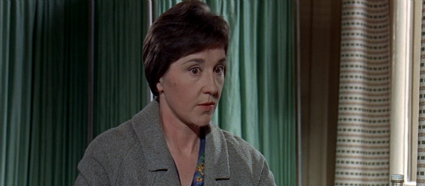 When we first see Merchant's Lily, she's a respectably bourgeois English housewife shocked by Alfie's scandalous flirtations with the nurses at the National Health Service hospital, where he shares a room with her recuperating husband. One fateful afternoon, however, a recently released Alfie and Lily cross paths when they both show up to visit the husband, who beseeches Alfie to drive Lily home so she won't have to suffer the complicated train journey. At once mortified and electrified by the suggestion, Lily protests but she's soon cowed by the adamant insistence of both men.
When we first see Merchant's Lily, she's a respectably bourgeois English housewife shocked by Alfie's scandalous flirtations with the nurses at the National Health Service hospital, where he shares a room with her recuperating husband. One fateful afternoon, however, a recently released Alfie and Lily cross paths when they both show up to visit the husband, who beseeches Alfie to drive Lily home so she won't have to suffer the complicated train journey. At once mortified and electrified by the suggestion, Lily protests but she's soon cowed by the adamant insistence of both men.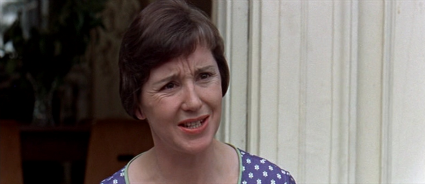 Once in the car, Lily's attitude toward Alfie softens, whether out of politeness or attraction we're not sure.
Once in the car, Lily's attitude toward Alfie softens, whether out of politeness or attraction we're not sure.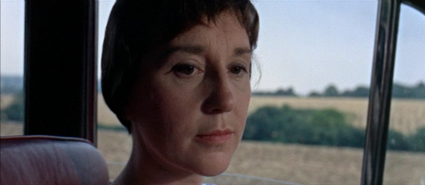 Once alone together, Alfie's reaction to Lily changes too. Caine's Alfie is startled to discover that Merchant's Lily is a not unattractive woman.
Once alone together, Alfie's reaction to Lily changes too. Caine's Alfie is startled to discover that Merchant's Lily is a not unattractive woman.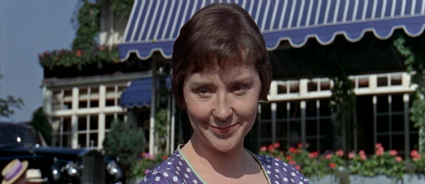 She's also the only "bird" in his company at the moment, and, because he's not really doing anything else, it seems only sensible -- to Alfie, at least -- that he fuck her.
She's also the only "bird" in his company at the moment, and, because he's not really doing anything else, it seems only sensible -- to Alfie, at least -- that he fuck her.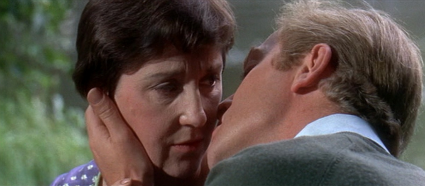 Which he does. In the dirt. Next to a pond. A sexual pitstop. On the way home from visiting her sick husband -- his friend -- in hospital. Yeah. And, fittingly enough, once her dress is buttoned, Merchant's Lily immediately thereafter disappears from the film's (and Alfie's) consciousness, at least until the "consequences" of Alfie and Lily's afternoon assignation manifest.
Which he does. In the dirt. Next to a pond. A sexual pitstop. On the way home from visiting her sick husband -- his friend -- in hospital. Yeah. And, fittingly enough, once her dress is buttoned, Merchant's Lily immediately thereafter disappears from the film's (and Alfie's) consciousness, at least until the "consequences" of Alfie and Lily's afternoon assignation manifest.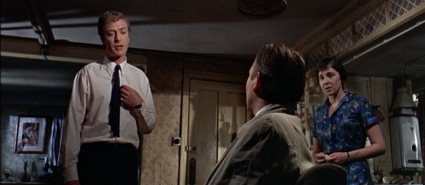 Merchant's Lily arrives to Alfie's dreary attic flat one rainy afternoon. Lily's pregnant. Alfie's made the arrangements. All that's left for them both is to wait for The Abortionist (a deliriously sleazy Denholm Elliott) to arrive. Lily's quick disappearance and sudden reappearance within the narrative help to underscore how, as a character, Lily functions as a poignant coordinate on the film's (and the audience's) slow journey of "realizing" the truth about Alfie. At first, both to Lily and to us, Alfie seems to be an awesomely skilled playboy (making out with nurses behind privacy curtains and all) but it doesn't take long before he's revealed to be something of a scoundrel (bedding his convalescing friend's wife just because he can). Finally, as Alfie natters idiotically during and after The Abortionist's visit, completely perplexed by the hassle of it all, the depth of Alfie's emotional infantilism becomes clear. It's also during and, especially, after The Abortionist's visit that Merchant makes a series of haunting performance choices that reveal the full scope of Alfie's selfishness.
Merchant's Lily arrives to Alfie's dreary attic flat one rainy afternoon. Lily's pregnant. Alfie's made the arrangements. All that's left for them both is to wait for The Abortionist (a deliriously sleazy Denholm Elliott) to arrive. Lily's quick disappearance and sudden reappearance within the narrative help to underscore how, as a character, Lily functions as a poignant coordinate on the film's (and the audience's) slow journey of "realizing" the truth about Alfie. At first, both to Lily and to us, Alfie seems to be an awesomely skilled playboy (making out with nurses behind privacy curtains and all) but it doesn't take long before he's revealed to be something of a scoundrel (bedding his convalescing friend's wife just because he can). Finally, as Alfie natters idiotically during and after The Abortionist's visit, completely perplexed by the hassle of it all, the depth of Alfie's emotional infantilism becomes clear. It's also during and, especially, after The Abortionist's visit that Merchant makes a series of haunting performance choices that reveal the full scope of Alfie's selfishness. First, as the two sit on the couch "after" the procedure, Alfie continues his blithe nattering, self-obsessedly gabbing about how it's all good when Merchant's Lily emits the beginnings of a high-pitched howl of animal pain.
First, as the two sit on the couch "after" the procedure, Alfie continues his blithe nattering, self-obsessedly gabbing about how it's all good when Merchant's Lily emits the beginnings of a high-pitched howl of animal pain.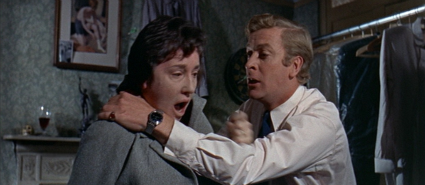 Caine's Alfie panics that Lily's making too much noise, that Lily's outburst will cause his landlady to call the cops, etcetera, so he hits her. This somehow stops Lily's wailing, thus permitting Alfie to explain to Lily how he had to slap her, how she just needs to calm down so as not to cause any more problems.
Caine's Alfie panics that Lily's making too much noise, that Lily's outburst will cause his landlady to call the cops, etcetera, so he hits her. This somehow stops Lily's wailing, thus permitting Alfie to explain to Lily how he had to slap her, how she just needs to calm down so as not to cause any more problems.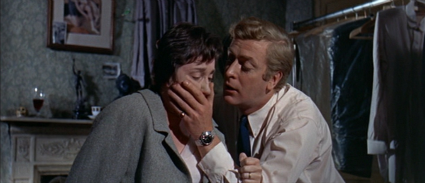 Then Alfie leaves Lily, alone, to miscarry.
Then Alfie leaves Lily, alone, to miscarry.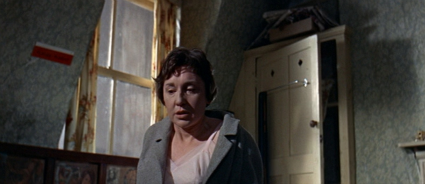 When Alfie returns, an hour or so later, everything's "over" and Merchant's Lily is on the couch, utterly spent.
When Alfie returns, an hour or so later, everything's "over" and Merchant's Lily is on the couch, utterly spent.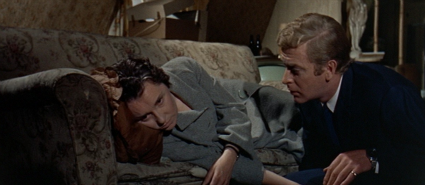 The two confer briefly about the situation and Merchant's Lily makes what is, I think, her first direct request of Alfie -- that he not go into the kitchen.
The two confer briefly about the situation and Merchant's Lily makes what is, I think, her first direct request of Alfie -- that he not go into the kitchen.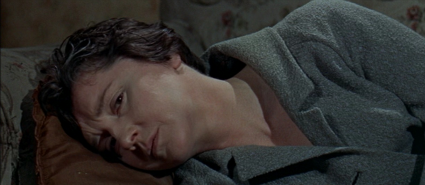 Of course, Alfie disregards Lily's plea and yanks the curtain open. In a quick flash of a moment, Merchant's Lily registers an expression of utter loathing and contempt, a blistering glance that underscores the extent of Alfie's cluelessly cruel selfishness. In this single moment, Lily realizes the devastating truth that Alfie has no interest in her (her experience, her reality, her existence) whatsoever.
Of course, Alfie disregards Lily's plea and yanks the curtain open. In a quick flash of a moment, Merchant's Lily registers an expression of utter loathing and contempt, a blistering glance that underscores the extent of Alfie's cluelessly cruel selfishness. In this single moment, Lily realizes the devastating truth that Alfie has no interest in her (her experience, her reality, her existence) whatsoever.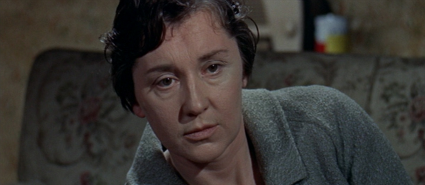 And so, in a gesture of self-protection guised as politesse, Merchant's Lily lifts herself to leave Alfie's apartment -- and Alfie -- behind her forever. And what does Caine's Alfie do? He decides to dress to go as well, nattering as usual, even tossing her a teddy bear he had intended for another of his progeny. Merchant's Lily, already a mother of three, holds the large stuffed bear as though it were a toddler, caressing it absent-mindedly, as Alfie -- oblivious to the potential cruelty of the gesture -- asks her to give it to her son "From his Uncle Alfie."
And so, in a gesture of self-protection guised as politesse, Merchant's Lily lifts herself to leave Alfie's apartment -- and Alfie -- behind her forever. And what does Caine's Alfie do? He decides to dress to go as well, nattering as usual, even tossing her a teddy bear he had intended for another of his progeny. Merchant's Lily, already a mother of three, holds the large stuffed bear as though it were a toddler, caressing it absent-mindedly, as Alfie -- oblivious to the potential cruelty of the gesture -- asks her to give it to her son "From his Uncle Alfie."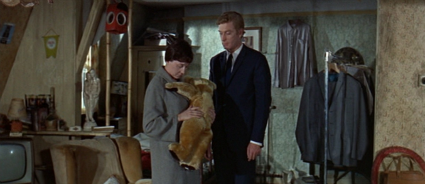 Merchant's performance as Lily is starkly human, tapping efficiently into the audience's empathy as a way to cue a more critical assessment of the charismatic leading character's choices and their consequences. A truly supporting performance, Merchant's work is vivid and precise, devastating in its moderated clarity. Merchant is careful never to overreach or overplay the character, reigning her persona to be within the scripted obligations of the role, and this might be why it's so easy to so admire her work even as it remains difficult to muster genuine enthusiasm for it. That said, Merchant's performance as the tragic Lily remains an enduring bit of actressing at the edges which fundamentally shapes the feeling of this strange period piece.
Merchant's performance as Lily is starkly human, tapping efficiently into the audience's empathy as a way to cue a more critical assessment of the charismatic leading character's choices and their consequences. A truly supporting performance, Merchant's work is vivid and precise, devastating in its moderated clarity. Merchant is careful never to overreach or overplay the character, reigning her persona to be within the scripted obligations of the role, and this might be why it's so easy to so admire her work even as it remains difficult to muster genuine enthusiasm for it. That said, Merchant's performance as the tragic Lily remains an enduring bit of actressing at the edges which fundamentally shapes the feeling of this strange period piece. Fascinating, challenging work.

4 comments:
Yay!
I have contradictory feelings towards Merchant's performance in "Alfie". When I saw the film, I thought it almost impossible that any awards body should choose her over almost any other of Alfie's girls, who seemed more competent to me at the time. However, as time has passed, when I think about this performance I undergo a sudden feeling of sadness transmitted by Merchant's Lily. Is that a triumph or what?
I think she did more with mere presence than any of the other girls in the category. The smile she gave to Alfie just before they got on the boat was a doozy. Too bad it had to be ruined by the annoying voiceover saying "Oh, look, she smiled, isn't that cute!"
she should have been first runner-up 2 sandy dennis...a marvelous perf...
Post a Comment